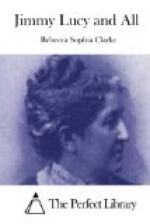THE FIRST DINNER
Mr. Templeton’s wife was just behind him. They both greeted the party as if they had all been old friends. The house, a large white one, stood as if in the act of climbing the hill. In front was a sloping lawn full of brilliant flowers, bordered with house-leek, or “old hen and chickens,” a plant running over with pink blossoms. Kyzie had not expected to see a garden like this on the mountain.
At one side of the house, between two black oak trees, was a hammock, and near it a large stone trough, into which water dripped from a faucet. Two birds, called red-hammers, were sipping the water with their bills, not at all disturbed by the arrival of strangers.
It was a small settlement. The hotel, by far the largest house in Castle Cliff, looked down with a grand air upon the few cottages in sight. These tiny cottages were not at all pretty, and had no grass or lawns in front, but people from the city were keeping house in them for the summer; and besides there were tents scattered all about, full of “campers.”
As the “bonnie Dunlees” and their elders entered the hotel, a merry voice called out:—
“A hearty welcome to you, my friends, and three cheers for Castle Cliff!”
Mr. and Mrs. Dunlee and the Sanfords walked on smiling, and the children lingered awhile outside; but it was a full minute before any of them discovered that the cheery voice belonged to a parrot, whose cage swung from a tall sycamore overhead.
“Polly’s pretty sociable,” laughed Mr. Templeton. “Do you like animals, young ladies? If so, please stand up here in a group, and you shall have another welcome.”
Then he clapped his hands and called out “Thistleblow!” and immediately a pretty red pony came frisking along and began to caper around the young people with regular dancing steps, making at the same time the most graceful salaams, pausing now and then to sway himself as if he were courtesying. It was a charming performance. The little creature had once belonged to a band of gypsies, who had given him a regular course of training.
“He is trying to tell you how glad he is to see you,” said Mr. Templeton, as the children shouted and clapped their hands.
“Oh, won’t Bab like it, though!” cried Lucy. “Seems as if I couldn’t wait till to-morrow for Bab to get here, for then the good times will begin.”
But for Kyzie and Edith and Jimmy the good times had begun already. The five Dunlees entered the house, little Eddo clinging fast to Jimmum’s forefinger. They passed an old lady who sat on the veranda knitting. She gazed after them through her spectacles, and said to Mr. Templeton in a tone of inquiry:—
“Boarders?”
“Yes,” he replied, rubbing his chin, “and they have lots of jingle in ’em too; they’re just the kind I like.”
“Well, I hope they won’t get into any mischief up here, that’s all I’ve got to say. Nobody wants to take children to board anyway, but you can’t always seem to help it.”




